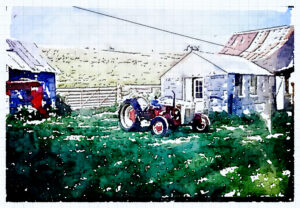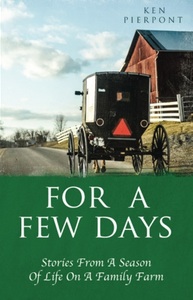Sunday was Mother’s Day. I preached an important message I called “Followers of Jesus Honor Women.” It was an important message. If you have not heard it maybe you could take a few minutes to listen to the sermon or watch it. It is about 35 minutes long and it comes from a place deep in my heart.
You can watch it here:
You can listen to it here:
Where Did You Come From? Where Are You Going?
This week I want to share with you an introduction to a book a wrote a few years ago. It is a collection of stories that all have something in common: They are stories that have their roots in my Grandparent’s Farm on Ohio. The introduction says a little something about the farm, about my people on my Dad’s side of the family, and about me. What is your story? Who are your people? Where did you come from? Somehow I thinking knowing where we came from helps us figure out where we’re going…

To My Heirs
Dear Children and Heirs,
This collection of stories was written with you in mind, though I pray many will read these stories over your shoulder. The stories here were written over about two decades and they don’t follow a strict timeline. I wrote them down as they tumbled out of my memory after cherishing them in my heart for many years. As you know many of these stories made their way into my messages. Some of you will find yourself finishing my sentences out of your memory of my telling them on a summer evening at camp or by a fragrant fire or on a long road trip. I hope you hear my voice in them and it pleases you.
I cherish in my heart a hope that many, many generations of Pierponts will follow hard after God. The consuming desire of my life has been to follow God all the days of my life and to inspire each of you to do the same. Nothing else really matters. I don’t care if you make a name for yourself. It is not my desire for you to make a lot of money or live for pleasures and comforts. More than anything else I simply want my children and the generations to follow to know God and live for Him. There is no ultimate satisfaction in anything else. There never has been and there never will be.
I wish I could take each of you to the farm of my boyhood. Maybe on those long Monday drives through Amish Country that is what I was trying to do. But the farm as I knew it is gone. To see it today you would never know what it was like, so I have gone back into my memories so you can “see” it too.
The Ohio of my Boyhood
As long as I can remember I’ve had a compulsion to write. When I began to write my stories my mind for some reason would travel back over the years and across the miles to the old, white, farmhouse snug in a valley off a gravel road in southeast central Ohio. Maybe one reason is because we moved a lot and the farm was a constant that changed very little in the years I was growing up. Times at the farm were happy times; holidays and vacations and reunions, so they stood out in my mind and lodge in my heart to this day.
The countryside around the farm was the kind of country that stays in your heart. Because we didn’t live there all the time, or because of some mystical genetic tug, the country there was my heartland and I suppose it is to this day. To go there was to encounter nature, beautiful countryside, and gentle foothills. In the summer the place was verdant with life, in the autumn it was splashed with color, in the winter it was a daring adventure, and in the springtime it was a breath of life. Oh how often I have longed to go back to that place and back to that time.
They say that every man has his heartland. I have adopted the State of Michigan—the great Mitten State. I have fallen in love with its cool summers and its colorful autumns. I have tasted of its abundant fruit and gazed long on its sweet-water oceans. I don’t even mind its long winters—they make the cherries of springtime sweeter. I have watched the sun sink into the blue water from high on Empire Bluff. From where I stood I could see South Manitou and the Empire light, the sun sinking down and the moon rising over my shoulder into the southeast sky—purple with dusk. We’ve biked around Mackinac Island and watched the sun set beyond the great span that connects the Michigan peninsulas. We’ve caught fish in its pure rivers. We’ve been chased by bats on an evening walk. We’ve watched in silent wonder the Aurora Borealis on the margin of a winter lake. We’ve skipped rocks and body-surfed along the unbroken miles of America’s wonderful Third Coast. It’s a spectacular land in places. How can you not love Michigan?
[I love Michigan and I belong here. I’ve lived more of my life in Michigan now than I did in Ohio] But deep in my heart is Ohio, the state of my birth, and in particular, the cluster of Ohio’s counties that begin to roll—Knox, Holmes, Coshocton, and Licking County.
The Farm
The Farm was in Licking County northeast of Newark, the county seat, and southeast of Utica, the nearest village of any size. It was nestled in a little valley east of St. Louisville.
St. Louisville is a humble burg, a gathering of a few dozen homes where the railroad, State Route 13, and the North Fork of the Licking River all run north and south.
On the way to the farm from north and west the drive would take us across flat farm landscape. East of Columbus the land began to roll a little. In Licking County on the north side of Newark, looking east from State Route 13 the first foothills became visible. To me, those hills have an indescribable beauty and charm. The memory of them floods my heart with warmth. I have seen snow-capped mountains and stunning rocky crags. I have seen roaring rivers in rocky canyons in the Rockies in the US and Canada. I’ve enjoyed the Adirondacks, the Appalachians, the Blue Ridge, and the Smokies. I’ve even travelled along the Sierra Madre Mountain Range in Mexico, but none of these mountain ranges stir me in the same way as those simple dark humps of earth in my homeland of Ohio.
The earthly remains of Jerome Pierpont and his son William Pierpont, his grandson Kenneth Pierpont who was my grandfather, and their wives all rest there now in the shadow of those hills. Their graves are within fifty yards of each other just a few miles south of the home place which was on the hill north of Chatham. This was their homeland. It must have been their heartland. They all lived there and died there. I have really only visited there. In all I have lived there only about eleven or twelve of my fifty years. So maybe my love for those hills is an acquired taste—but I don’t think so. When I stand on one of those hillsides on an October evening and look out across hills backed by purple hills I have an inexplicable stirring deep in me that must be more than simple love of nature and appreciation of beauty.
I don’t know if I will ever go back there for more than a visit. I sometimes wonder. I wonder if I will have a place there in the New Earth one day, when Christ is King on earth and when the earth has been refined and travel is swift and time is no factor. I have learned to love and appreciate my adopted land. This land may become your heartland and the heartland of your children, but I can’t imagine feeling the same way about any other place in the world.
To get to the farm we drove into Saint Louisville from the north off Route 62 or from Newark to the south. We would turn east and drive through the village. In my early years there was an old barn there. The paint was all weathered off but the barn was half-covered with years of Ohio license plates. In the years of my childhood the State of Ohio issued a new plate every year. The collection made a quaint and colorful welcome to the village.
In a few blocks we were on our way to the base of the first line of hills. The road turned among the hills and came to a “Y” in about a mile. I think they call the road Stickle Road now. I’m not sure they always did. We turned left and climbed a hill with a sharp curve at the top. At the base of the hill the road crossed Martinsburg Road and continued on to another fork. We took another left past a house that was usually yellow. I think a lady named Sadie lived there because my grandfather always called it Sadie’s Hill. My grandpa made up his own names for things. Later I was surprised that other people did not know the names he attached to places.
The road turned again past the Berger home and then ascended the last hill before the farm. The gravel road narrowed there so much that it was our tradition to sound our horn to warn oncoming traffic. (Though I never really ever remember meeting anyone on the road there). To the right at the crest of the hill there was a beautiful old split-rail fence weathered by the years marking the margin of my grandfather’s farm.
In the valley to the left just across the spring run set the square old white house. The sight of it was always so dear to us that we broke into cheering when it came into sight.
From Oklahoma to Ohio
There was a time that stands out in my memory. I was in the seventh grade. We had moved to Oklahoma. We all remember it as a terrible experience. One night we just got sick of it. It was late September and hot as August back home. We were sitting around sweating and complaining one night and Dad just announced that we were going back to Ohio. In a few hours we all got in the car and just drove out of town. We were ecstatic to be going back to Ohio. We drove to Tulsa and stopped to eat. Sitting in the parking lot of a hamburger stand my folks had second thoughts about leaving without bringing things to proper closure. We kids sat in back quietly eating and listening to our parents conversation as they came to the conclusion that they needed to go back. We were sick with disappointment. They drove back to Oklahoma City that night.
Dad made the proper arrangements and in two weeks we all loaded up again and made the move. When we crossed back into Ohio we all celebrated wildly. Within a few hours we were making our way along the gravel roads to our beloved farm. It was cool October. The leaves swirled down and the air was wonderfully cold. It seemed like a holiday to us. We were so glad to be in Ohio and so happy to be staying at the farm. We enrolled in school in Utica and rode the school bus through the autumn countryside to and from school.
We lived on the farm until we got our own home a few weeks later. I rode the school bus along the winding gravel back roads to the farm gulping down the cool autumn air. There was something beautiful about seeing the bright yellow bus crawl along the hillsides among fields of ripened corn and the brilliant maples of October. To me it was like heaven in comparison to the strange land where we tried to live in a big, flat city, in a small unremarkable house among strangers. No one had taken the trouble to give the streets there decent names. They were numbered. Our bodies were there and we tried to adjust but our hearts were never in it.
The farmhouse wasn’t empty or occupied by strangers. The name on the mailbox was our own name, Pierpont. The people who lived there were our people. We could be ourselves with them without being misunderstood. We could speak our heart without fear of censure. It was a safe, warm, simple, wonderful place. There was always food there and the coffee was on.
I don’t want to idealize things overmuch. The coffee was truly wretched. The only way to tolerate it was to mix into it equal parts of milk and sugar. I don’t think anyone ever drank it black. I’m sure it was made in the morning and cooked all day long. I was well into adulthood before I realized that coffee could taste almost as good as it smelled if you brewed good coffee fresh in the right way and you didn’t let it cook or burn. But such as it was—the coffee was always on.
There were vehicles and farm implements there that took on personalities and even names and animals that made their way into our hearts and into our family lore. I didn’t realize it at the time but it was there that I discovered the charm of a Ford 8N tractor. I listened to my grandfather’s stories and songs. I learned about wild strawberries, mint, catnip, mushrooms, puffballs, catfish and mayapples. If I had had the sense to pay attention, I would have learned much more and this would be a longer, richer book
My grandparents and Uncle Bill and Aunt Marlene, Aunt Ann and my cousins spoke with a regional dialect that hinted of the mountains of West Virginia and Kentucky. I spent enough time in Michigan and Western Ohio that my brothers and sisters and mom did not have that sound but my dad, who was born and grew up in the county seat was the only one who sounded like that. I’ve been away now for years and when I do get back I am surprised and fascinated by the way the people talk.
A Turn in the Providence of God’s Leading
After years away the Lord had a surprise for us. I was called to a small village church just seven miles as the crow flies from the farm I loved so much. It was in Knox County which borders Licking County on the North. There were people in the village who actually remembered my great uncle Orville and his wife Audrey. They say she had a great recipe for groundhog. She still lived a few miles away in the village of Utica.
Out on pastoral visitation one day I met a man who had grown up with my grandfather and his brothers. His name was Russell Litt and his wife’s name was Paulene. They lived in a tidy white cottage right in the village of Brandon on St. Rt. 661. He had interesting stories to tell about the Pierpont boys that I had never heard before. He had vivid memories of them playing checkers on the front porch of the General Store in Chatham as young men.
A young man in our church managed a pizza place in Utica. He told me one day that there was a framed picture of my grandfather with his graduating class on the wall of the restaurant. On Monday nights the restaurant had a good special and we would often take advantage of it. Whenever we were there I would gaze on that photo of those young people. They were facing life in one of the most difficult times in American history. They would survive the Depression and they would face a great world war. At the time none of them knew it. My grandfather’s young face was among them. What would he think if he had known when he posed for that picture that one day his great-grandchildren would stand and look at it on display in a pizza restaurant on the street of his home town? I wonder who will read this book who shares my blood, maybe even my last name, who I will never meet on earth?
A high-school education in those times was not to be taken for granted. In order for my grandfather to acquire one, he had to board in Utica, ride a bike, and work a special job. He did have enough time to play football. He loved to proudly proclaim that during the time that his older brother Elmer and he played football for Utica High School, no opponent ever crossed their goal line, which, oddly, he insisted on pronouncing, “gool line.”
My dad and I were both named Kenneth after my grandfather. Grandpa was a farmer, a pastor, a factory-laborer, an amateur boxer, baseball player, and lay-naturalist. He was a hunter, a fisherman, an outdoorsman, and a gentleman. He was a storyteller.
He worked for over thirty years at a factory in Newark, Ohio known then as Fiberglass. Grandpa was what they now commonly call a bi-vocational pastor. He was a late-blooming pastor, ordained to the ministry by the Christian Union Church at fifty-five years old. I was very small but I remember my Grandfather’s ordination service in the building they call the Tabernacle on the old conference grounds in Greenfield, Ohio.
For about the first twenty years of my life Grandpa and Grandma Pierpont owned and operated a small beef cattle farm in central Ohio. It was a modest farm. If you were to drive by on the road you would not slow down any more than the curve required. The farm occupied a hilly 110 acres. Driving past on the road you would have no way of knowing how much living and learning and laughing and loving happened on that place in the two decades it was a part of our lives. This is my attempt to tell at least a part of the story and to preserve much that was good about it.
Grandpa Pierpont was a colorful man. He was a big man for his time. He was six-foot one and weighed about two-hundred pounds. Before the influence of Christ in his life he had a quick temper and he was not reluctant to use his fists. This was greatly changed when Grandpa began to walk with the Lord, but I think it is fair to say that he never completely overcame this weakness. I always wondered if he didn’t admire and subconsciously model his personality after John Wayne.
My grandpa was a changed man when he yielded his heart and will to Christ. Some things changed forever immediately. Some held stubbornly on most of his life.
He was born and raised north of Newark near the little village of Chatham. He had an older sister, Dorothy and an older brother Elmer. He also had two younger brothers named Arthur and Orville. His little sister Grace died when she was small.
He met my grandmother when they both worked at a farmer’s market in Newark. Her name was Grace, too. Grace Sasser. He always called her Tiny. She was deceptively small. Until the day of her death she had eyes blue as a mountain lake. They had three children, my dad, Kenneth Frederick, a daughter Virginia Ann, and a son named Charles William—my Uncle Bill. They raised the children in Newark, through the years of the Great Depression and the Second World War. Grandpa always longed for a farm but there would be no money for that until the children had all married and left home. That was about 1956.
Almost all the stories in this book took place on that humble farm. Woven into the stories are things I would like to pass on to my own children and grandchildren. When “choring” with grandpa on the farm he often treated us to stories of his past, our wonderful heritage. I would like to do the same.
This should be an interesting book, even for people we do not know, because within it are timeless ideas that are universally true, but for you it will be a small part of a story about a small part of your family, a part of who you are. I wish you could have been there, but since you couldn’t, sit down for a while and let me tell you some stories. You will have your own places and your own people. You will have your own memories and traditions. I hope reading these memories will show you how to cherish people and places God brings along your path.
If you are reading this book and you are not a part of my family, I hope reading it tugs your heart toward home and toward God. [From the Introduction to “For A Few Days; Stories From A Season of Life on A Family Farm.”]
If you are still reading you may be interested in the reading the rest of the book. You can get a copy here.

Have you ever written about your life? If you did, what stories would you tell?
Bittersweet Farm
May 11, 2021


